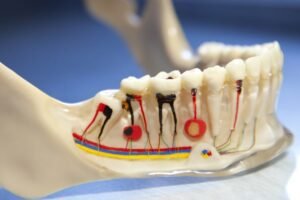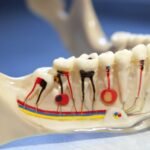What is an Endodontist?
An endodontist is a dental specialist focusing on the complex issues affecting the tooth’s pulp—the nerves, blood vessels, and tissues deep inside the tooth. The visible part of your teeth, known as enamel, covers the inner layers that endodontists treat using advanced techniques.
What Does an Endodontist Do?
Endodontists are experts in diagnosing and treating tooth pain originating from the pulp and root tissues. Their primary goal is to alleviate pain while preserving the natural tooth whenever possible. They are skilled in saving even severely damaged or decayed teeth.
Common Reasons to Visit an Endodontist
Endodontists treat problems involving damaged tooth pulp or root tissues, often caused by:
- Tooth Decay: Poor oral hygiene can lead to cavities that damage the tooth’s root, causing inflammation or infection in the pulp.
- Tooth Injuries: Trauma from accidents can harm the tooth’s structure.
- Tooth Abscess: Bacterial infections can lead to pus accumulation inside the tooth or gums.
- Cracked Tooth: Cracks can allow bacteria to infiltrate and infect the tooth.
Endodontic Procedures
While general dentists can perform root canals, endodontists are specialists who frequently handle these procedures, making them highly proficient. Key procedures include:
- Root Canal: Removing damaged or infected pulp and sealing the tooth to prevent reinfection.
- Endodontic Retreatment: Correcting issues from a previous root canal that didn’t heal properly.
- Endodontic Surgery: Performing surgeries like apicoectomy, which removes the root tip.
- Emergency Dental Surgery: Addressing severe dental injuries or infections.
- Tooth Extraction: Removing teeth that are too damaged to save.
- Dental Implant Surgery: Placing implants to support prosthetics after tooth removal.
In addition to these specialized procedures, endodontists are also trained to perform general dentistry tasks such as cleanings, whitening, veneers, and crowns.
Diagnosing Tooth Problems
Endodontists use various diagnostic tests to identify the causes of tooth, mouth, and facial pain:
- Dental X-Rays: Provide detailed images of tooth structures.
- Hot or Cold Sensitivity Tests: Assess how teeth respond to temperature changes.
- Percussion Tests: Tapping on teeth to detect inflammation and its spread.
Comparing Endodontists and General Dentists
While all endodontists are dentists, only about 3% of dentists have the specialized training to become endodontists. Dental specialists include:
- Endodontists: Focus on internal tooth issues.
- Periodontists: Treat gums and jawbone.
- Orthodontists: Align teeth and bites.
- Oral Surgeons: Perform complex surgeries, including maxillofacial procedures.
Training for Endodontists
After completing a four-year dental school program, aspiring endodontists undergo at least two additional years of specialized training. This advanced education focuses on diagnosing and treating tooth pain related to internal tooth tissues.
After Endodontic Procedures
Recovery from endodontic treatments varies based on the procedure’s complexity. Most treatments are outpatient, allowing patients to return home shortly after. Mild discomfort is common after a root canal, with some patients returning to work the same day. More extensive surgeries may result in longer-lasting discomfort. Following the procedure, your endodontist might recommend a follow-up with your regular dentist to place a crown on the treated tooth for added protection.
When to Consult an Endodontist
Contact a trusted dental provider if you experience persistent or worsening tooth pain. Prompt evaluation increases the likelihood of saving your natural tooth. You might need an endodontist if you have:
- Persistent tooth pain
- Unexplained mouth or jaw pain
- Sensitivity to heat, cold, or sweet foods
- Inflammation around teeth or gums
Seek immediate treatment for signs of severe infection, such as fever, difficulty breathing or swallowing, and swelling that extends to the cheek.







